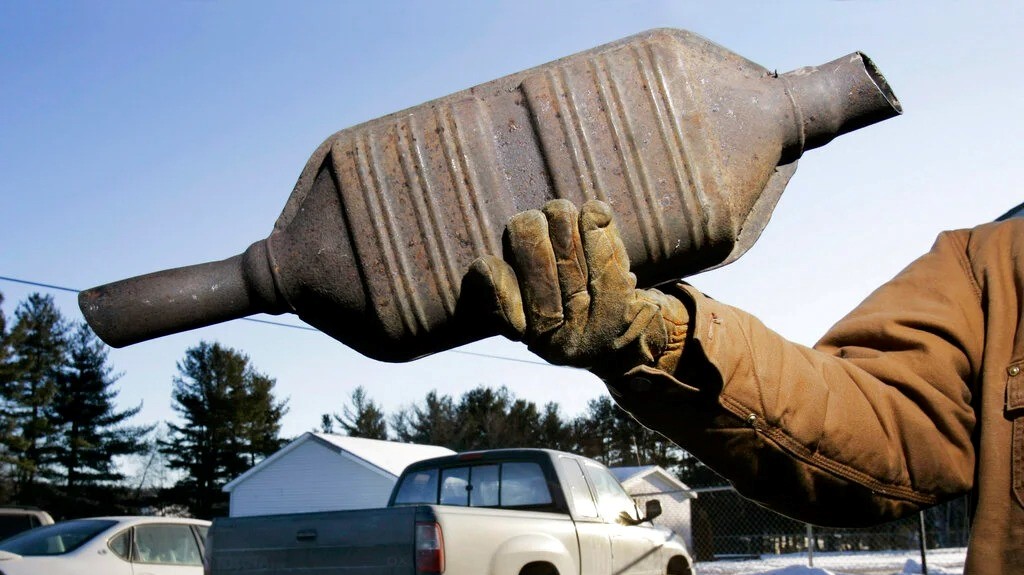
Catalytic converter thefts in St. Paul down 95% since pandemic peak, according to police data
The buzz of a battery-powered saw biting into an automobile’s exhaust pipe became all too familiar to St. Paulites during the COVID-19 pandemic, as catalytic converter thefts surged to unprecedented levels.
But that unwelcome sound is much less common lately, officials say.
Reports of stolen catalytic converters in the city have plummeted 95% since peaking in March 2022, according to St. Paul police data.
Statistics collected by the Minnesota Department of Public Safety tell a similar story. Reports of auto parts theft statewide have fallen 87% in the same period.
What accounts for this dramatic drop?
Last fall, authorities broke up a nationwide catalytic converter theft ring, which allegedly included four Minnesota men accused of selling thousands of the devices — cut from area vehicles — to buyers across the country.
State lawmakers and local officials also have imposed new restrictions on the sale and transportation of detached catalytic converters, making it a crime to even possess one without proof of ownership.
But perhaps the best predictor of catalytic converter theft rates has been the market price of the precious metals they contain.
Palladium, rhodium and platinum prices spiked during the pandemic, making the devices lucrative targets for criminals. As those prices have dropped over the past year and a half, so have catalytic converter thefts.
“I think all of those things are feeding into it,” said Aaron Cocking, who has lobbied the Minnesota Legislature for tighter regulation of catalytic converter sales as president of the Insurance Federation of Minnesota. “We certainly like the trend.”‘
Lucrative targets
Bolted onto the exhaust systems of gasoline-powered vehicles, catalytic converters remove pollutants from automobile emissions by forcing them through filters coated with precious metals — usually palladium, rhodium and platinum.
Not long ago, catalytic converter theft was relatively rare — St. Paul police logged just 45 cases in 2014. That began to change as precious metals prices rose during the latter half of the decade. Reports of stolen catalytic converters in the city totaled 345 in 2019.
Then the COVID-19 pandemic sent precious metals prices skyrocketing, according to Joe Pickard, director of commodities for the Institute of Scrap Recycling Industries.
Disrupted global supply chains and shuttered precious metals mines played a role, but inflation may have been the primary driver, Pickard said.
When lockdowns eased and businesses reopened, consumer products and raw materials for manufacturing all got more expensive. Precious metals are often viewed by investors as a hedge against inflation.
“There’s a close connection between inflation expectations and investor funds moving into the precious metals space,” Pickard said.
This made catalytic converters irresistible to many thieves, who spent their nights driving around with a hydraulic jack and a reciprocating saw, in search of vehicles with the highest concentration of precious metals attached to their undercarriage.
Tommy Jenkins fits a catalytic converter to replace one stolen from a customer’s 2018 Mitsubishi Outlander at his Wonderful Muffler Man garage on Rice Street in Roseville on March 17, 2021. (John Autey / Pioneer Press)
Among the most desirable were Toyota Priuses and Mitsubishi Outlanders, said Tommy Jenkins, who saw a surge in demand for replacement catalytic converters at his Wonderful Muffler Man automotive repair shop in Roseville.
“I was probably doing four to five a week,” he said. “That’s crazy for me because I’m just a one-man shop.”
Thieves could easily sell the stolen converters on the black market for hundreds of dollars, with some fetching upward of $1,000.
The cost to replace one can be three times as much. And if the vehicle’s owner doesn’t have comprehensive insurance coverage, it comes out of their pocket.
“It’s a big deal when our community members are having their catalytic converters stolen,” said Sgt. Mike Ernster, a St. Paul police spokesman. “They’re not a cheap part to replace. … If they don’t have a catalytic converter, they can’t use their car.”
The wave of catalytic converter thefts crested in St. Paul in March 2022 when police logged 362 cases — an average of more than 11 a day.
Declining precious metal prices
The upward trend in catalytic converter thefts in St. Paul and statewide quietly reversed in spring 2022, as the prices of precious metals — especially rhodium and palladium — also began a steady decline.
“They wouldn’t be stealing the stuff if it wasn’t worth a lot,” said state Sen. John Marty, DFL-Roseville, who co-sponsored legislation that tightened restrictions on the possession and sale of catalytic converters. “It clearly has an impact.”
At its height in 2021, rhodium was valued at nearly $30,000 an ounce. It now fetches just $4,400. An ounce of palladium, which sold for nearly $3,000 in early 2022, is now worth less than $1,000.
“From the folks I’ve talked to, it does sound like the fact that we’ve seen a drop in these precious metals prices is playing a role,” Cocking said of the decrease in catalytic converter thefts.
“Maybe there’s not as much of a desire or as much of an incentive” for thieves, he added.
Pickard attributes the declining prices of precious metals to the slowing global economy and rising interest rates.
In fact, the sustained decline in precious metals prices and in catalytic converter thefts both began around the same time the Federal Reserve began aggressively hiking its benchmark interest rate to tame inflation in March 2022.
But other factors are also at play, Pickard said. While the pandemic caused a temporary shortage of precious metals, analysts are now concerned about oversupply. Increased production of electric vehicles, which don’t use catalytic converters, likely plays a role, too.
Related Articles
A St. Paul church opened six tiny homes for those experiencing homelessness. Officials are praying the effort goes statewide.
Lake Elmo Airport’s new runway gets more use — and more complaints
Federal investigators say pilot disorientation led to 2021 plane crash that killed 3 in west metro
‘Grateful’: Hudson bicyclist continues recovery after hit and run, with help from local community
Lame-duck St. Paul City Council rushes to finish line with bevy of legal amendments
‘A whole national ring’
As metals prices began falling, law enforcement officials were closing in on a vast national ring of catalytic converter traffickers.
New Jersey brothers Navin and Tinu Khanna incorporated DG Auto Parts in 2020 and quickly positioned it as a clearinghouse for catalytic converters stolen across the country, according to a federal indictment.
Intermediaries in other states bought converters from “cutters” — the street-level thieves who remove the devices from vehicles — and allegedly funneled them to the Khannas, who would strip out their precious metals and sell them for scrap.
One of the many feeder outfits plugged into the Khanna network was allegedly headed by 32-year-old Justin Tyme Johnson of St. Paul and 41-year-old John Charles Kotten of Hutchinson.
Between May 2020 and October 2022, Johnson and Kotten bought thousands of catalytic converters directly from cutters across Minnesota or through middlemen, including 31-year-old Soe Nye Moo of St. Paul and 34-year-old James Dillon Jensen of Minneapolis, according to a federal indictment unsealed six weeks ago.
All four men have pleaded not guilty to the charges against them.
Moo “acted as a regular intermediary” for Johnson and Kotten, serving as a “point of contact for many street-level cutters in and around St. Paul,” the indictment said.
Once they had the catalytic converters in hand, the men allegedly stored the devices at their homes or in commercial properties owned by Johnson and Kotten, where they were sorted, inventoried and priced.
Johnson and Kotten then sold them to buyers in New Jersey, Oklahoma, Colorado and elsewhere, transporting the stolen goods in U-Hauls and personal vehicles, the indictment said.
The proceeds from these sales allegedly totaled about $21 million. A single shipment in January 2021 netted Johnson’s and Kotten’s ring nearly $700,000, according to the indictment.
As catalytic converter thefts mounted in St. Paul, city police stood up a unit dedicated to investigating the crimes.
“Our investigators started working to identify who was doing it and to stop it,” Ernster said. “They determined a group of people was involved in the thefts and where the catalytic converters were going. … This tied into a whole national ring of people who were dealing in these auto parts.”
When the ring was broken up in October 2022, the impact on catalytic converter thefts in the area was almost immediate, Ernster said.
“When people were being arrested and this group was being taken down, we saw a big drop,” Ernster said. “You could see it in our numbers.”
Although precious metals prices have begun to stabilize in recent months, reports of catalytic converter thefts in St. Paul have continued to fall. In November, police logged just 18 cases.
New laws on the books
Despite these promising trends, the problem of catalytic converter thefts has not disappeared entirely.
“They’re still stealing them,” said Jenkins, the Roseville mechanic who replaces the devices. “I’m still doing a good clip of one to three a week.”
Tommy Jenkins shows the end of a catalytic converter at his Wonderful Muffler Man garage on Rice Street in Roseville on March 17, 2021. (John Autey / Pioneer Press)
State and local lawmakers have recently imposed restrictions on who can transport, buy and sell catalytic converters.
Since 2020, the St. Paul City Council has passed ordinances making it a misdemeanor to possess detached converters without proof of ownership and outlawing their sale to anyone other than a licensed scrap metal dealer.
During the 2023 session of the Minnesota Legislature, lawmakers passed a bill co-sponsored by Marty, which makes it a crime to possess a detached converter that is not marked with the VIN of the vehicle it was removed from.
The new state law, which took effect in August, also regulates the sale of the devices, prohibiting cash transactions and barring anyone other than a registered scrapper from buying a used catalytic converter. The law requires buyers to enter information about each sale into a state-run electronic database.
“The best thing we could do now is make sure Iowa, Wisconsin and other states pass similar laws,” Marty said. “I think that’s what will wipe out the market.”
Cocking is hopeful that this new state law — in combination with lower precious metals prices and the takedown of a prolific theft ring — will keep catalytic converters from again becoming the attractive targets they were a year and a half ago.
“It’s only been a couple of months, but I think we’re optimistic that all of these things taken together will put a damper on it,” Cocking said.
“I don’t want people to let their guard down,” he added. “I certainly don’t want people to think the threat is over, but it’s nice to see the heightened numbers are subsiding a little bit.”
Related Articles
Minneapolis grocery store clerk dies after customer impales him with a golf club, police say
Judge acquits first defendant in fatal shooting of Alex Becker in St. Paul alley
Man shot by St. Paul officer during exchange of gunfire has died, BCA says
LGBTQ+ activists in Minnesota want prosecutors to treat the killing of a trans woman as a hate crime
Oakdale man receives 4-year prison term for role in downtown St. Paul robbery, fatal shooting


